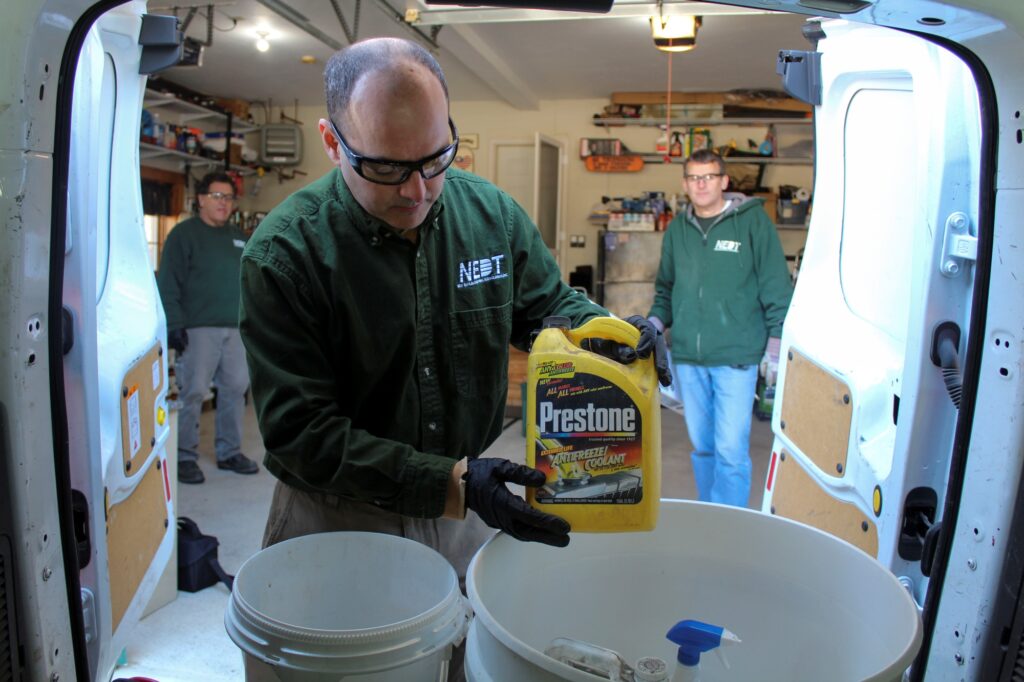Whether you just like to save a few dollars performing self-service on your car or are a full gearhead, doing it yourself (DIY) when it comes to automotive vehicles does come with one major drawback: waste. Whether you’re changing the oil or swapping batteries, you’re producing household waste products that are difficult or impossible to dispose of at home. Learn how to dispose of the most common garage hazardous waste, along with tips for handling and storage in the meantime.
Motor Oil and Oil Filters
Often, the starting point for car DIYers is changing their own oil. Motor oil changes, with preparation and the right tools, are a relatively straightforward task on most vehicles, but disposing of the empty containers and used motor oil can be harder. A more advanced option is replacing your oil filters, though these often need to also be drained of motor oil, so either way, you’ll need motor oil disposal. Options include returning oil to the place of purchase, checking local service shops, or contacting your municipality. Learn more in our blog, Your Options for Motor Oil Disposal in Massachusetts.
Learn more in our dedicated Fact Sheet: Motor Oil & Oil Filters.
Additional Automotive Fluids
Of course, motor oil isn’t the only fluid that can be swapped out of cars. Whether you get them from regular replacement or as part of a larger project, the following fluids need to be handled and disposed of properly:
- Antifreeze and Coolant: Coolant is toxic, and due to its sweet smell and bright color, it can be a hazard to both animals and small children. Spent antifreeze may contain metals from the engine, such as lead, zinc, and copper, and needs special disposal.
- Windshield Wiper Fluid: This typically contains cleaning products such as solvents. Empty bottles can be placed in the recycling bin, but unopened ones should be used up or given away. Filled containers of used products should be taken to disposal facilities.
- Brake Fluid: Most modern brake fluids are glycol-ether-based, but they can also be mineral oil- or silicon-based. Empty containers can be thrown in the trash, but unopened ones should be used up or given away, while filled containers of used products should be taken to proper facilities.
- Transmission Fluid: Automatic transmission fluid (ATF) is a complex mixture of liquids, including petroleum derivatives, which serve as lubricants. It may also function as a vehicle’s hydraulic fluid. It should be treated similarly to motor oil for disposal.
Learn more in our blog about automotive fluids, as well as the dedicated Fact Sheet: Automotive Fluids.
Dealing with Car Batteries
Unlike their household equivalents, which mainly use alkaline or nickel-cadmium, almost all car batteries are lead-acid batteries. Lead and sulfuric acid are hazardous materials that require proper disposal at designated facilities; they are too dangerous to discard in the trash (not to mention, it’s illegal to do so). For disposal, if you’re replacing it, the store from which you bought it will often take back the old battery. Likewise, scrap and automotive centers may take them. Learn more about your disposal options in our blog, What is the Hazardous Waste in Car Batteries?
Also see our dedicated Fact Sheet: Automotive Batteries.
Regardless of the automotive waste you generate from your car maintenance, NEDT can help. We offer disposal services to New England residents for their household hazardous waste when other options aren’t available or feasible. This includes not only automotive waste, but also many other types of household hazardous products. If you’re interested in drop-off or at-home pick-up to finally get rid of garage hazardous waste and more, see our locations, contact us online, or call us at 1-866-769-1621.




Leave a Reply